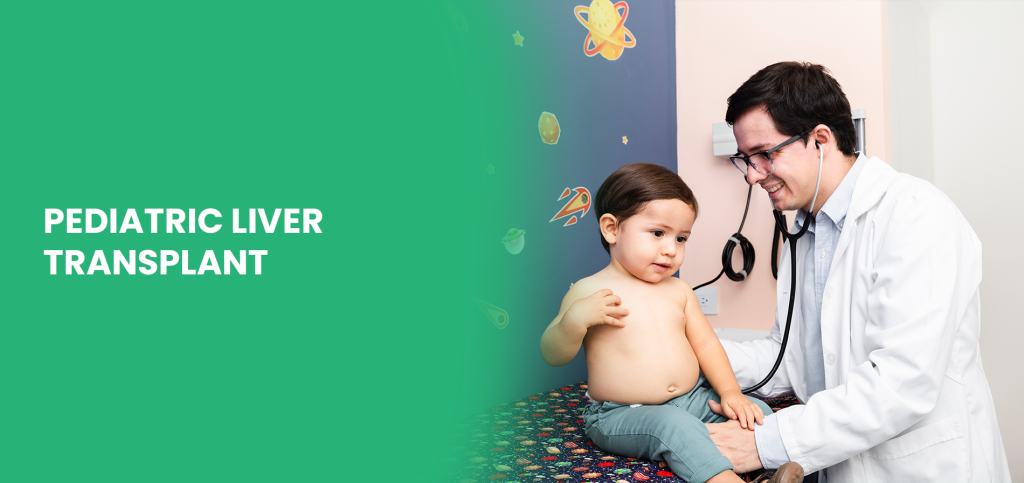
Liver Transplant Surgery involves removal of the diseased liver from the patient and replacing it with a healthy liver from a donor. The donor can be a close relative who donates a part of the liver to the patient. Liver is the only organ in the body which has the capacity to regrow. The donor’s liver grows back to normal size within 80-100 days of the donation. The liver can also come from a person who has been declared brain dead. This is known as Cadaveric Liver Transplant Surgery. When the age of the patient who is undergoing Liver Transplant Surgery is less than 12 years, it is called Paediatric Liver Transplant.
A liver transplant is recommended for children who have serious liver problems and will die without a new liver. The most common liver disease in children who need transplants is biliary atresia. This is a rare disease of the liver and bile ducts that occurs in newborns.
Other conditions may include:
Possible complications from liver transplant surgery may include:
In order to get a cadaveric liver transplant, the patient has to be registered with an approved Liver Transplant Hospital in India. The hospital will upload the details of the patient on the web portal www.notto.gov.in. On this portal, each hospital will have their own waiting list and the deceased donor liver will be given to the hospitals by rotation. The liver which has been retrieved at a Government hospital in India will be given to the government hospitals and if the liver has been retrieved at a private hospital then it will be allocated to a private hospital. Metro Hospital at Faridabad is the latest addition to the list of private hospitals in India which have been approved for Liver Transplant. The waiting list of recipients at Metro hospital, Faridabad is therefore short and the chances to get a deceased donor liver transplant are much higher if the patient gets registered at Metro Hospital Faridabad, India. The liver from a Pediatric Cadaveric Donor can be used for a pediatric patient only but the liver from an adult cadaveric donor can be used both for adult as well as a pediatric patient. The liver from an adult cadaveric donor can be given to two patients also – one adult and one pediatric.
Once a deceased donor liver is available, the patient who is highest in the wait list will get a call to come immediately to the hospital. Pre surgery tests would be carried out after admitting the patient to the hospital. During the surgery, Liver transplant surgeon will give a long incision on the abdomen and removes the diseased liver and places the donor liver the body of the patient. The liver is then attached to bile ducts and blood vessels are connected. The surgery would take 8-10 hours and a team of liver transplant surgeons, anaesthetists and specially trained ot techs would assist the Chief surgeon.
Once the liver has been placed and connected, the surgeon will close the incision using stitches or staples. The patient is shifted to the ICU after the surgery. The hospital stay of the patient for Liver Transplant Surgery would be 25-30 days.
After the liver transplant surgery in India, the patient is kept in intensive care unit (ICU) for 5-7 days for better care and continuous monitoring. Blood tests are carried out regulary to check your health parameters including the functioning of the new liver. Once all the health parameters are stable, the patient is shifted to the room. The stay in the room could be anywhere from 5 days to 25 days depending upon the speed of your recovery. Most of the patients who have been waiting for a long time for liver transplant do not have a good health so their recovery takes more time than those who get Living Donor Liver Transplant. Once you are discharged from the hospital, you will continue to recover at home. You would be required to get some blood tests while you are recovering. You will have to take several medicines during the recovery period which normally lasts for 6 months. Some medicines called immunosuppressants have to be taken lifelong. These medicines will suppress your immune system and prevent the rejection of the new liver by the body. However since these immunosuppressants reduce the immunity of your body, you will be more susceptible to other infections. You will therefore have to take much more care of your health as compared to other people who have not undergone such a surgery.
The cost of hospitalization, tests, surgery and medicines during your hospital stay in India would be Rs. 20 – 25 Lacs or USD 40-50 thousand for International patients. If you have to stay in a hotel after discharge from the hospital then that cost would be extra. Cadaveric Liver Transplant surgery has a good success rate and 5 year survival after the surgery is close to 90% at most of the centres in India. Dr. Ankur Garg has been the Chief Liver Transplant Surgeon at Nanavati Hospital before joining Metro Hospital, Faridabad.

